
Jenna Laurenzo bubbles with nervous excitement, and it’s little wonder why–her first feature film, Lez Bomb, is just about to play it’s first Los Angeles preview. The movie opens in select cities and on VOD beginning November 9. Laurenzo writes, directs and plays the lead role in the film.
Produced by comedy lion Bobby Farrelly (director of There’s Something About Mary), Lez Bomb follows the slapstick mishaps of Lauren (played by Laurenzo), a young lesbian in love as she tries to come out to her family over the Thanksgiving holiday. The supporting cast includes Steve Guttenberg (Can’t Stop the Music), Elaine Hendrix (Romy & Michelle), Kevin Pollack (The Marvelous Ms. Maisel), Bruce Dern (Nebraska) and Oscar-winner Cloris Leachman (Young Frankenstein), returning to comedy at age 92.
We caught up with Lorenzo just ahead of the LA preview to chat about the movie, coming out and dealing with queer holiday madness.
Lez Bomb follows in the grand tradition of holiday screwball comedies like Christmas Vacation or Home for the Holidays, except it’s actually told from the POV of a gay person. What made you want to explore this genre?
How about we take this to the next level?
Our newsletter is like a refreshing cocktail (or mocktail) of LGBTQ+ entertainment and pop culture, served up with a side of eye-candy.
I felt like there was a wide open gap. This is a film I really wanted at the holidays and didn’t have. I grew up loving those types of films like Meet the Parents or Family Stone, all these films that had this collision of characters who are all going through their own stuff. And I really wanted a comedy like this that I could press play on at Thanksgiving with my entire family and feel totally comfortable about it. My grandfather is the type of person who walked out of the theatre at Rent…
Oh lord…
[Laughter]
So I’m like where is the disconnect? How can a story that has an LGBTQ storyline be acceptable for people with very strong opinions? And so I wanted to tackle that, but also tap into the nostalgia of these family films I loved so much.
What were your anxieties about working within a genre so well-explored, that you had so much reverence for?
I think there’s, like, certain tropes that you want to lean into, but also turn on their head. I wanted it to feel like one of those films that used to get made but don’t anymore. I was hoping that the nostalgia of it would make it super relatable, that it would be like oh yeah, this feels like something we’ve seen but haven’t seen. In terms of comedy, I just wanted it to move really fast. I remember I was at a pitch one time and the people I was pitching to were like “you know, our audience these days, they’re watching the movie at home on their phone and on their iPad.” And I kept thinking about that. It’s true—everyone is so distracted. In terms of keeping things moving and high stakes, I feel like it’s kind of a necessity in terms of keeping people watching.
How did you get hooked up with Bobby Farrelly?
So Bobby was at a festival that my short film Girl Night Stand was at. And he saw it, and really liked it. And at the same time, my script had landed in the hands of Rob Moran who had worked a lot with Bobby. And Rob had said, “we’re making Lez Bomb.” And I believed him. And he was right. He said we should meet.
So we met, and [Farrelly] really responded to the themes and the way I was trying to deliver medicine with sugar. When he read the script he really loved it, and he gave me some thoughts. So slowly but surely he really came on as an executive producer. He’s an incredible mentor and friend. Collaborating with him, I’m just so grateful. I grew up watching Dumb and Dumber and There’s Something About Mary over and over again. There was actually a Dumb and Dumber quote in the original script. It didn’t make it into the movie because the scene got reworked. When I read the script, I was like, oh my gosh, this is so embarrassing.

So what sort of advice did he give you?
My biggest takeaway and the most valuable lesson in collaborating with him is he really kept encouraging me to not be afraid to lean into the jokes and what I was trying to do and not feel like I needed to be sensitive to everyone. There were moments in the movie where I was like is this going to rub people the wrong way? And he was like “you can’t be worried about that.” You can’t be worried about how everyone is going to see it, and you can’t be afraid to lean into these moments. To be honest, some of those moments get the biggest laughs in the film, and I’m really grateful that he sort of pushed me to find that courage.
That’s fantastic. You wrote, directed and you star in the movie. When you’re on set, how do you keep your focus switching from one job to another? How do you deal with the stress?
So I have an acting coach that I love working with. And we went through the script a lot. So I, from an acting standpoint, prepared it in so much detail before we got on set. Then when we got on set, I sort of knew all the emotional beats and where I was so I didn’t really have to think too much. I knew where I was emotionally. I could focus on the directing. We shot right after Thanksgiving and during my actual family Thanksgiving. We shot in my family home.
Oh wow.
During my actual Thanksgiving, I positioned my entire family and basically storyboarded the film. During Thanksgiving.
There’s a movie in that. Using your family to prep a movie?
[Laughter]
And I feel very positive my grandparents still have no idea what I do.
One thing I love about your style of writing and directing—your dialogue tends to overlap; it reminds me of Mike Nichols. If you’ve seen his film Postcards from the Edge people kind of talking over one another and never really listening. How do you prep your actors for that?
Well, we didn’t have a lot of time to improvise. We shot 15 days of photography with the stars, and then we had three pick-up days. We just didn’t have the luxury of time to improvise. Bruce [Dern, who plays Grandpa] manages to throw in some improvised moments, but Bruce Dern is Bruce Dern. He’s allowed to do what he wants to do.
When we were doing those family scenes, it was really important for me to make it feel like that. Because often in these kinds of movies it doesn’t have that kind of feel. So even though sometimes it’s a challenge in the edit, I was so happy that we gave ourselves a lot of takes with the actors just talking with no overlap. But we also shot a few times where there was overlap so we had room to play in the edit so we could get that feeling. Because I know, when I’m home for the holidays, and my family’s talking, is anybody even listening to each other?
[Laughter]
So there were a couple moments in there with Cloris and Bruce where I just threw in some lines, even under other people talking that makes no sense but I think are hilarious. I wanted it to feel like one of those movies that people could watch over and over again and pick up on a random joke here or there.
On average how many takes did you do for something like this?
I wish I could say more. We had about three takes. And sometimes, because we shot my coverage last, usually, I was lucky if I got two or three.
That’s a lot of pressure to put yourself under as an actor.
When I started out with this project, I had tried to attach a lead actress and a director for six years.
Wow.
You hit a point of fatigue where it’s either going to happen or it’s not. So I just felt like I had to do it myself. That’s why I made my short film Girl Night Stand. It was just supposed to be a proof-of-concept. Then, when it went viral and opened some doors, and financing came on, I knew that was the sort of framework with which we were going to execute this movie. It was definitely a lot of pressure, but I had an incredible support team around me.

You definitely had it when it comes to the cast. Were you intimidated about directing big-name actors? You have Oscar winners in the cast, legends.
Of course. When Cloris walked on to set, I was like holy crap, I cannot believe this is happening. But the thing is, once I met them, and I talked about what I wanted, and I was very clear about the vision I had, and what I was trying to do, they were always supportive and always collaborative. I felt like as long as I was very clear with them, and while it is intimidating, I didn’t have too much time to overthink things. I had to stay very clear and focused on what I was trying to do. They were all real game for it.
Who surprised you the most of these icons?
Cloris.
Really?
There are so many moments on and off camera she surprised me. When she came onto the set, her daughter was like, “mom’s really tired today. We just went skydiving.”
Wow.
And I was like umm. You know, little gems like that. She’s so full of life. I can’t tell you in the filming process and in the edit, I learned so much from just watching the way these legends work. The camera would turn on, we’d start rolling, and Cloris would just light up. She would be so aware of where the camera was. She would say, “Can you see me? Can you see me right here?” And then she would do something absolutely absurd, which gave me so many wonderful options in the edit of landing on her doing something hilarious.
That’s awesome.
Steve Guttenberg showed up on set, and on the first day, I had to throw him in the trunk of a car. And he was just down for it. I was kind of nervous about it. I was like “so nice to meet you, can you get in the trunk?” And he was so excited. That was wonderful.
On a more serious note, one element the film explores is that the difficulty in coming out often stems less from the people we address than from our own discomfort with our sexuality. How closely does Lauren’s coming out mirror yours?
Very. I just felt like I, for a long time, was worried about what my parents were going to think, or that I was going to disappoint them. My mom wanted me to marry an Italian man and have all these babies. I felt like I wasted a lot of time worrying about what they would think, and by the time I actually came out, I was mad at them for not understanding something I never gave them the opportunity to understand. They were so OK with it. As my mom [Dedrie O’Connell] says in the movie, “We have to adjust our expectations.” But I think that comes with anything—it doesn’t even have to be about sexuality. It’s always that tension that develops where reality doesn’t match what we grew up expecting.
Sure.
I always reference how when my wife & I were getting married, I was like this is interesting. Our first dance, this is not what I had imagined. This isn’t the fairy tale I grew up watching. Isn’t it crazy that I can grow up watching Beauty and the Beast and Belle & the Beast are dancing and I’m like, “this is so romantic.” What’s it going to look like when we dance? It’s just we haven’t really seen that. So it’s one of the reasons why it’s important for me to create more representation, just because the more familiar it is, it leaves an impression in the consciousness—hopefully, a wider consciousness.
How old were you when you came out?
I had to come out a few times because I wasn’t clear.
[Laughter]
I came out in college, then to my parents at around 22 or 23.

That’s funny because it also seems like Lauren’s family doesn’t quite believe it’s even possible she could be gay. Do you think coming out is different for gay men than it is for women?
I’m not sure. I don’t know. It’s hard for me to say because I only know what my personal coming out was like. I have friends, both men, and women, that their experiences could not be further from each other along the spectrum, in terms of difficulty. I have friends who knew they were gay right out of the gate. And I think that’s so incredible, so interesting to me because I had no idea. There were so many clues along the way that I was like, how did I miss that? But sometimes it’s just lack of exposure.
My mom definitely is still like, “I don’t know how I missed it.” I think her most disappointment was that she feels like she missed this whole thing where she wasn’t there for me. And my best friend kind of felt the exact same way, but then she was just upset that I was never attracted to her.
[Laughter]
It’s so funny that you say that. I have a friend who is completely straight. We grew up around the block from each other. He could not get over, for years after I came out, he could not get over the idea that I was not in any way attracted to him. I don’t know what that says.
[Laughter]
So this is your first feature film. So what are your ambitions? Do you want to keep directing? Acting? Writing?
It depends on the project. I had the amazing experience of acting in Green Book, which is coming out in November. Being on set with those kinds of collaborators was so inspiring. It was wonderful that it wasn’t my own work. I like jumping into the imagination of someone else, and that forces growth in so many other ways. So I think acting in other people’s projects.
Then when it comes to my own scripts, I’m really interested in directing more of my own scripts as well.
Lez Bomb opens November 9 in select cities (TBA) and on streaming services.


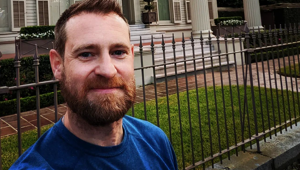
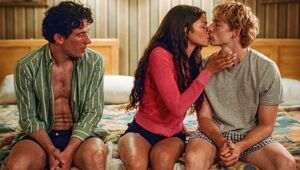
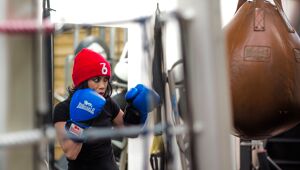

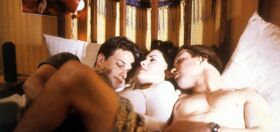
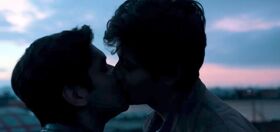
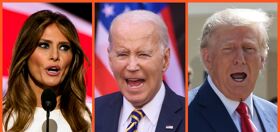




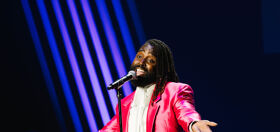
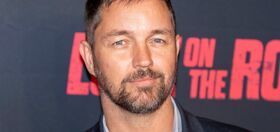
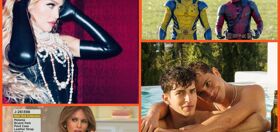
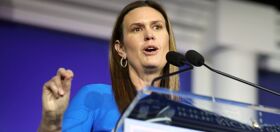

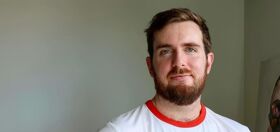
Catholicslutbox
There are more lesbians on tv than gay men- including those in family friendly cartoons.
The representation of gay men has been steadily declining.
Yooper
I’m just happy Cloris Leachman still has here wit together. She is a gem.